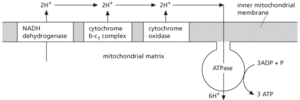A theory postulated by the British biochemist Peter Mitchell (1920–92) to explain the formation of ATP in the mitochondrial electron transport chain. As electrons are transferred along the electron carrier system in the inner mitochondrial membrane, hydrogen ions (protons) are actively transported (via hydrogen carriers) into the space between the inner and outer mitochondrial membranes, which thus contains a higher concentration of protons than the matrix. This creates an electrochemical gradient across the inner membrane, down which protons move back into the matrix. This movement occurs through special channels associated with ATP synthase, the enzyme that catalyses the conversion of ADP to ATP, and is coupled with the phosphorylation of ADP. A similar gradient is created across the thylakoid membranes of chloroplasts during the light-dependent reactions of photosynthesis.

Chemiosmotic theory